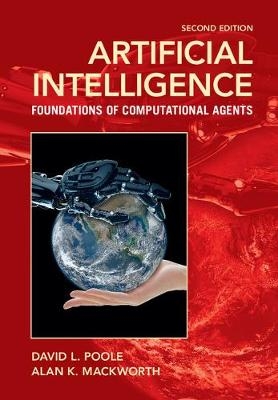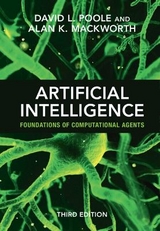
Artificial Intelligence
Cambridge University Press (Verlag)
978-1-107-19539-4 (ISBN)
Artificial intelligence, including machine learning, has emerged as a transformational science and engineering discipline. Artificial Intelligence: Foundations of Computational Agents presents AI using a coherent framework to study the design of intelligent computational agents. By showing how the basic approaches fit into a multidimensional design space, readers learn the fundamentals without losing sight of the bigger picture. The new edition also features expanded coverage on machine learning material, as well as on the social and ethical consequences of AI and ML. The book balances theory and experiment, showing how to link them together, and develops the science of AI together with its engineering applications. Although structured as an undergraduate and graduate textbook, the book's straightforward, self-contained style will also appeal to an audience of professionals, researchers, and independent learners. The second edition is well-supported by strong pedagogical features and online resources to enhance student comprehension.
David L. Poole is a Professor of Computer Science at the University of British Columbia. He is a co-author of three artificial intelligence books including Statistical Relational Artificial Intelligence: Logic, Probability, and Computation (2016). He is a former Chair of the Association for Uncertainty in Artificial Intelligence, the winner of the Canadian AI Association (CAIAC) 2013 Lifetime Achievement Award, and a Fellow of the Association for the Advancement of Artificial Intelligence (AAAI) and CAIAC. Alan K. Mackworth is a Professor of Computer Science at the University of British Columbia. He has authored over 130 papers and co-authored two books: Computational Intelligence: A Logical Approach (1997) and Artificial Intelligence: Foundations of Computational Agents (2010). His awards include the Artificial Intelligence Journal (AIJ) Classic Paper Award and the Association of Constraint Programming (ACP) Award for Research Excellence. He has served as President of the International Joint Conference on Artificial Intelligence (IJCAI), the Association for the Advancement of Artificial Intelligence (AAAI) and the Canadian AI Association (CAIAC). He is a Fellow of AAAI, CAIAC and the Royal Society of Canada.
Part I. Agents in the World: What Are Agents and How Can They Be Built?: 1. Artificial intelligence and agents; 2. Agent architectures and hierarchical control; Part II. Reasoning, Planning and Learning with Certainty: 3. Searching for solutions; 4. Reasoning with constraints; 5. Propositions and inference; 6. Planning with certainty; 7. Supervised machine learning; Part III. Reasoning, Learning and Acting with Uncertainty: 8. Reasoning with uncertainty; 9. Planning with uncertainty; 10. Learning with uncertainty; 11. Multiagent systems; 12. Learning to act; Part IV. Reasoning, Learning and Acting with Individuals and Relations: 13. Individuals and relations; 14. Ontologies and knowledge-based systems; 15. Relational planning, learning, and probabilistic reasoning; Part V. Retrospect and Prospect: 16. Retrospect and prospect; Part VI. End Matter: Appendix A. Mathematical preliminaries and notation.
| Erscheinungsdatum | 12.11.2017 |
|---|---|
| Zusatzinfo | Worked examples or Exercises |
| Verlagsort | Cambridge |
| Sprache | englisch |
| Maße | 182 x 261 mm |
| Gewicht | 1820 g |
| Themenwelt | Informatik ► Theorie / Studium ► Künstliche Intelligenz / Robotik |
| ISBN-10 | 1-107-19539-X / 110719539X |
| ISBN-13 | 978-1-107-19539-4 / 9781107195394 |
| Zustand | Neuware |
| Haben Sie eine Frage zum Produkt? |
aus dem Bereich



